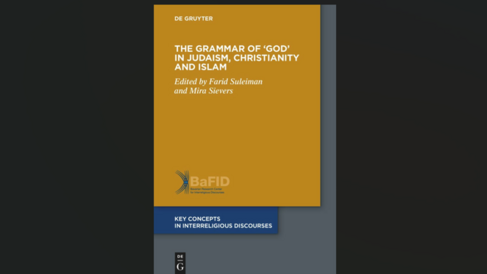
CIP Deputy Director, Daniel H. Weiss is among the co-authors of a new volume exploring how philosopher Ludwig Wittgenstein (1889–1951) might serve as a refreshing intermediary for dialogue between Jewish, Muslim and Christian scholars.
The book is the outcome of a 2020 Reading Weekend, as the co-authors discussed key passages from Wittgenstein, and a 2021 workshop sharing and responding to chapter drafts.
Classical Greek thought has often served as a third party, shaping questions and discussion of philosophers and theologians across the Abrahamic traditions. Weiss and company placed Wittgenstein as their third party, emphasising his concept of philosophy as grammatical investigation. The book represents conversations around theology as grammar, with a focus on the word “God”.
Weiss’s essay
Introducing Weiss’s main essay, volume editor Mira Sievers writes:
“Weiss explores the theological implications of ascribing a specific name to God by conducting a Wittgenstein-inspired analysis of classical rabbinic literature and modern Jewish philosophy of religion. According to the Hebrew Bible, God has a specific proper name (YHVH), but humans are told to avoid wrongful use of it. Weiss contrasts this with the view held by some Christian and Jewish traditions, suggesting that God, as the ‘creator of all,’ should be regarded as nameless or ‘beyond names.’
“The classical rabbinic sources, however, retain the idea of God’s name while discussing its usage restrictions, differentiating between its pronunciation (YHVH) in the Temple and its substitute term (Adonai) outside the Temple. This pattern is analyzed as the ‘grammar’ of God’s name.
“To address objections related to anthropomorphism, Weiss introduces Wittgenstein’s methodology of ‘looking’ rather than merely ‘thinking,’ which reveals that the assumption of God’s name implying a created being may be unnecessary. The rabbinic approach, in alignment with Wittgenstein’s ‘grammatical’ orientation, upholds the notion of God’s name while maintaining respect and transcendence befitting the creator.
“This contribution demonstrates how Wittgenstein’s approach can liberate theologians and philosophers from undue concerns surrounding the concept of God’s name.”
The volume
The above summary comes from Sievers’ chapter-length introduction. Elsewhere in the volume, Farid Suleiman (co-editor) probes the distinction between the “God of the philosophers” and the “God of Abraham” in Islamic perspective, while Genia Schönbaumsfeld introduces relevant themes from Wittgenstein’s theology as a prequel to discussing the Trinity in Christian theology.
A 10-page epilogue captures the co-authors’ reflections on each other’s work. This serves also to invite readers into the conversation, as eavesdroppers on an active inter-religious dialogue.
Further reading
The Grammar of ‘God’ in Judaism, Christianity and Islam (ed. M. Sievers & F. Suleiman) is out now from De Gruyter. It is volume 15 in the series Key concepts in interreligious discourses, DOI 0.1515/9783111501611. For the full contents, please visit deGruyter.com.
Members of Cambridge University will be able to access Weiss’s chapter, “Wittgenstein and the rabbinic grammar of God’s name”, alongside the rest of this edited collection on iDiscover.
